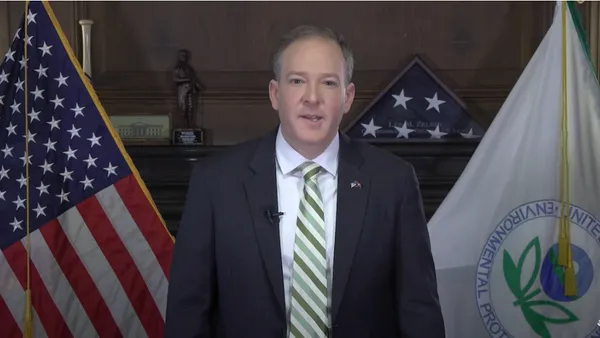Dive Brief:
- Violence against mayors was a common occurrence last year, according to research conducted by Oklahoma State University academics, with support from the Mayors Innovation Project and Equity Agenda. Ninety-four percent of mayors who responded reported experiencing psychological violence at least once; 24% experienced at least one threat; and 16% suffered physical violence.
- Women mayors of color reported the highest rates of harassment and threats: 46% of women mayors of color reported being harassed at least monthly, compared with 0.8% of mayors who are non-Hispanic White men.
- The survey polled 3,151 mayors in fall 2021, with 971, or 31%, responding. The survey was supported in part by a research grant from the Center for American Women and Politics at Rutgers University.
Dive Insight:
The pandemic has ushered in an era of increased violence in cities, including against local officials and mayors.
More than 80% of local government officials have experienced some form of harassment, abuse or violence, according to a 2021 National League of Cities report. Those incidents included death threats, vandalized homes and outrage in public meetings. That level of harassment and intimidation is driving away local leaders from public office, National League of Cities President Clarence E. Anthony wrote in an April opinion piece for Smart Cities Dive.
“Our leaders and their families deserve better,” Anthony wrote. “Local government is the foundation of America, and we must ensure that the people who step up to serve and better our communities aren’t driven away. If they are, we all stand to lose.”
The OSU survey also found the violence is affecting individuals' decisions about public service. Nearly 70% of mayors said they knew someone who chose not to run for office due to those issues, and 32% said they thought about leaving office themselves.
In the report, one survey respondent cited "uncivil action" as the No. 1 reason that individual chose not to seek reelection after serving as mayor for one year and a council member for more than 10 years.
Women mayors choosing not to run for reelection will have very real impacts on local government and democracy, according to Heidi Gerbracht, founder and director of Equity Agenda and co-founder of the Women Mayors Network, particularly as reelection and tenure are critical in terms of what a mayor can accomplish.
The report revealed that 17% of women mayors of color and 10% of non-Hispanic White women mayors reported experiencing sexualized and gendered violence at least monthly, compared with 0.8% of non-Hispanic White men mayors. Nearly 18% of women mayors of color reported facing violence that’s critical of their race at least monthly, as did 18% of men of color mayors.
“Intimidation, threats, harassment via email, phone and (primarily) social media are constant and wearing,” one survey respondent said. “Posts regarding my home security, deliveries to my home, and repairs to my home have been posted online. Posts including sexual slurs occur with some regularity. My cell number and photos of my husband have been published. Posts of mine have been shared with…hate groups.”
An increasing number of women have been coming into political power and entering local office, said Gerbracht, who also warned about the consequences of that trend reversing. “A democracy that is not representative of the people that it's governing is not a legitimate democracy," she said. And to help mitigate the violence, Gerbracht said, supporting a mayor’s requests for resources is key. “It’s important that local governments are willing to commit resources — sometimes funding — to protecting the people that are providing public service," they said.











